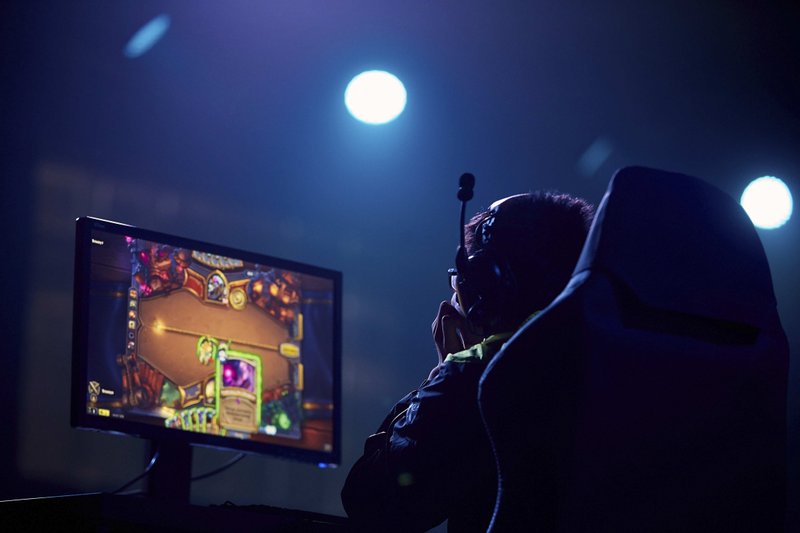Video games in the Olympics? Here’s how it might work

In this photo taken by LAUREL Photo Services on Tuesday, Sept. 26, 2017, an esports competitor takes part in the Asian Indoor and Martial Arts Games in Ashgabat, Turkmenistan. Including competitive computer games, known as esports, could give the Olympics a younger audience and a huge revenue boost from a rapidly growing market, but would be deeply controversial. (David Aliaga/LAUREL Photo Services via AP)
ASHGABAT, Turkmenistan — The future of the Olympics may just be in a basement in Turkmenistan.
With leading Olympic figures considering a possible role for competitive computer games — known as esports — at the 2024 Games in Paris, a pan-Asian competition in the ex-Soviet state offers a possible vision of the future.
Including esports could give the Olympics a younger audience and a huge revenue boost from a rapidly growing market, but would be deeply controversial.
The Olympic Council of Asia included esports as an official demonstration event at its Asian Indoor and Martial Arts Games this week, with teams from China and nine other nations battling in four games ranging from space combat in “StarCraft II” to card-game strategy in “Hearthstone.”
Supporters of esports in the Olympics say their event is a real sporting contest, one which prizes strategy and lightning reactions over physical agility.
“It needs different skillsets from different people,” competitor Jess Joaustine Tamboboy from the Philippines told The Associated Press. “It doesn’t really have a physical requirement because you can see around us the players are short and tall, maybe a little bit thin, maybe a little bit fat. But all they have in order to qualify to play for these types of titles are just their cognitive or mind skills.”
Esports aren’t a natural fit for Turkmenistan, one of the poorer ex-Soviet nations, though one where internet access is growing rapidly.
The rules weren’t explained in the local language, but that didn’t turn off the crowd of up to 200 in the windowless basement of a sports arena from cheering and whooping at a particularly spectacular kill or skillful strategy.
Still, the attendance was tiny compared to big pro esports events, which can pack thousands into traditional sports arenas, and it didn’t make much of a splash online. Fewer than 50 viewers at a time watched some opening-round matches Monday on Twitch, a leading game streaming service that regularly attracts tens of thousands of concurrent viewers to its more popular streams.
If esports make it to the Paris Olympics, it would redefine what Olympic sport is meant to be.
The International Olympic Committee has previously resisted calls to add “mind sports” like chess that don’t involve physical exertion, or events where machines are key, like auto racing.
Deciding which games to pick is fraught, too. The IOC has a sponsorship deal with Chinese company Alibaba, which has major esports interests, but rival firms have their own popular brands.
The IOC also fears violent games would hurt the Olympics’ image.
IOC president Thomas Bach told the South China Morning Post, an Alibaba-owned newspaper, earlier this month that he’d prefer sports simulations.
“We want to promote non-discrimination, non-violence, and peace among people. This doesn’t match with video games, which are about violence, explosions and killing. And there we have to draw a clear line,” he said.
All four of the games on the program this week in Turkmenistan featured some form of combat, though in fantasy settings with cartoon-style animation techniques. There weren’t any realistic military-themed shooting games on the program.
Bach also said esports needs a firmer structure. The IOC is used to dealing with a single governing body for each sport, like FIFA for soccer or the International Gymnastics Federation. Esports has its own international federation, but with limited influence over a web of private interests including games publishers, competition organizers and players’ teams.
The event in Turkmenistan showed how that system doesn’t yet fit smoothly with the Olympic movement.
IOC sponsor Alibaba’s Alisports division was in charge of the event, and used an open online qualifying system. That prompted federations from Australia and South Korea to boycott, saying athletes should have been picked by their national Olympic committees in the manner of a traditional sport.
If esports make it to the Olympics, other potential problems for the IOC include criticism it’s moving away from promoting a healthy lifestyle, and that it’s ignoring poorer countries where fast computers and brand-new games are unaffordable.
Esports would also mean the IOC allowing private companies to set the rules of its competitions.
Most traditional sports treat the rules with reverence, only occasionally tinkering around the edges. Not so for games publishers, who routinely mix things up to attract new players and keep things fresh.
Adding just one new character can reshape the whole “meta” — the game’s constantly evolving web of tactics and counter-tactics.
Senior figures in the IOC and the esports world have publicly doubted esports will be ready for an Olympic debut in seven years’ time.
“We are still some way away from our vision and we need to start on the right foot,” Asian Esports Federation president Kenneth Fok said last week. “For esports to develop in a positive banner, we need the full support of each and every NOC, their government, and more importantly the general public to have a positive perception of electronic sports.”